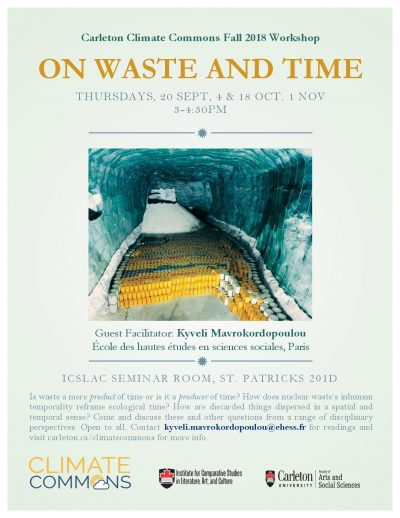Climate Commons Fall 2018 Workshop
(In partnership with the Institute for the Comparative Study of Literature, Art, and Culture)
On Waste and Time
ICSLAC Seminar Room, St Patricks, 201D
Thursdays, 20 Sept, 4 and 18 Oct, 1 Nov, 3-4:30pm
Guest Facilitator: Kyveli Mavrokordopoulou, École des hautes études en sciences sociales, Paris (Visiting Scholar, Carleton University)
Waste never really disappears. Waste accumulates and persists in the environment and as a result, introduces complex temporalities. In industrial societies of mass consumption, different types of waste are produced on a daily basis, and demand extended storage or disposal solutions. In this regard, it stands among the major environmental concerns of our time that confront humans with inhuman and non-human factors, by its temporality, non-locality and evasive nature. Scientific research around waste management may attempt to find definitive solutions (e.g. deep geological disposals for nuclear waste), but some types of waste resist any solution, and fail to be contained, determinate, or calculable (Hird, 2012).
Even though waste is construed as a material testimony from the past, at the same time, it projects us into the (deep) future, and hence poses additional questions: is waste a mere product of time or is it a producer of time? How does, for instance, nuclear waste’s inhuman temporality reframe ecological time? More generally, how are discarded things dispersed in a spatial and temporal sense? Departing from Mary Douglas’s influential theorisation of waste as ‘‘matter out of place’’ in Purity and Danger (1966), this workshop fleshes out questions around waste’s temporal natures through more recent scholarship; we will reread Douglas’s position through authors that stress the intricate entanglements of waste’s materiality and temporality for a future-oriented environmental thought.
Each session will last 1.5 hours: the first part will be devoted to the reading material. Throughout the second part, we hope to confront theory with case studies from the literature, the arts and politics. We highly encourage participants to bring examples to the table that could be relevant to the questions discussed and could operate as an impulse for the collective discussion as well as an opportunity to share research (although this is not a prerequisite for participation to the group).
The group will be accompanied by the screening of Containment (2015), a documentary on the legacy of Cold War nuclear waste by Peter Galison and Robb Moss.
Organised by Kyveli Mavrokordopoulou, École des hautes études en sciences sociales, Paris
For access to the reading materials please contact: kyveli.mavrokordopoulou@ehess.fr

Reading material –
First session
Thursday 20 September, 3:00-4:30pm
Hird, Myra J. ‘‘Waste, Landfills, and an Environmental Ethic of Vulnerability’’. Ethics and the Environment, Vol. 18, No. 1 (Spring 2013), pp. 105-124
“The Phenomenon of Waste-World-Making”. Rhizomes: Cultural Studies in Emerging Knowledge, Vol. 30 (2016), pp. 1-8.
Second session
Thursday 4 October, 3:00-4:30pm
Viney, William. Waste. A Philosophy of Things, London, New York: Bloomsbury, 2014. (selection to be determined)
Third session
Thursday 18 October, 3:00-4:30pm
Reno, Joshua. O, Waste Away: Working and Living with a North American Landfill, Oakland: UP California, 2016. (selection to be determined)
Fourth session
Thursday 1 November, 3:00-5:00pm
Hecht, Gabrielle. “Interscalar Vehicles for an African Anthropocene: On Waste, Temporality, and Violence”. Cultural Anthropology, Vol. 33, no 1 (2018), pp. 109-141 https://doi.org/10.14506/ca33.1.05